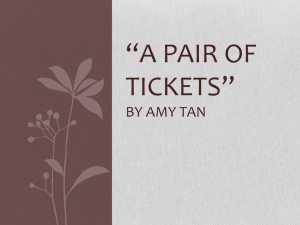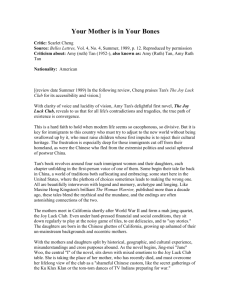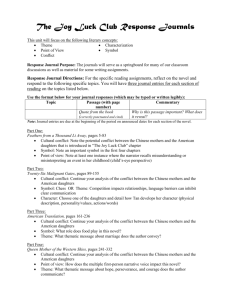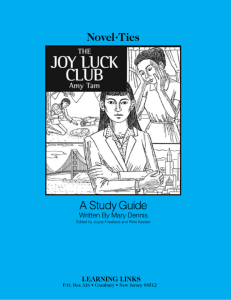The Joy Luck Club: Novel Overview & Analysis
advertisement
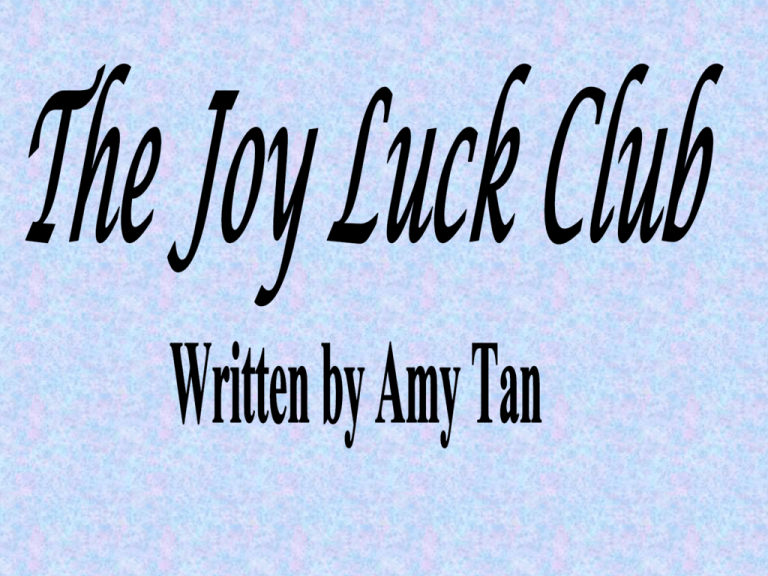
About the Author: Amy Tan • Tan was born in California to immigrant parents from China. • Tan also co-produced the film version of The Joy Luck Club. • Her short stories are often found in anthologies and textbooks for high school and college curriculums About the Author: Amy Tan • Her father came to America to escape the turmoil of the Chinese Civil War. • Tan’s mother had a different life in China. She had divorced an abusive husband but lost custody of her three daughters. She was forced to leave them behind when she escaped on the last boat to leave China before the Communist takeover in 1949. Biography continued… • Just as she was embarking on this new career, Tan's mother fell ill. She promised herself that if her mother recovered, she would take her to China, to see the daughter who had been left behind almost forty years before. • Mrs. Tan regained her health, and mother and daughter departed for China in 1987. The trip was a revelation for Tan. It gave her a new perspective on her difficult relationship with her mother, and inspired her to complete the book of stories that makes up The Joy Luck Club. • After being published in 1989, Tan's book won enthusiastic reviews and spent eight months on the New York Times best-seller list. Information from: http://www.achievement.org/autodoc/page/tan0bio- Historical Context • The first major wave of Chinese immigration to the United States took place around the 1840's. • Prompted by the gold rush and westward expansion, Chinese men came to the country to pursue work. Chinese, Gold Mining in California [illustration]: From Roy D. Graves pictorial collection: Chinese and Chinatown Historical Context • Another influx of Chinese immigrants came in the 1860s to work on the construction of the Transcontinental Railroad. Historical Context • By 1880, a growing Chinatown was flourishing in New York City, and Chinese businesses began in other cities of New York. • In 1882, Congress passed Exclusion Laws that prevented the immigration of Chinese laborers. The prejudice and discrimination that Chinese immigrants faced made it difficult for them to find a job. Historical Context • Editorial cartoon showing a Chinese man being excluded from entry to the "Golden Gate of Liberty". The sign next to the iron door reads, "Notice—Communist, Nihilist, Socialist, Fenian & Hoodlum welcome. But no admittance to Chinamen." At the bottom, the caption reads, "THE ONLY ONE BARRED OUT. Enlightened American Statesman—'We must draw the line somewhere, you know.'" Historical Context • In response, many set up restaurants or hand laundries. • Laundries took little capital to establish and classified the operators as merchants, an allowed immigration category under Exclusion laws. San Francisco Chinese laundry, 1881. Historical Context • The end of World War II, and the new communist government in China toward the end of the 1940's prompted another major exodus of Chinese as well as a slight reversal of attitude among EuroAmericans. • The mothers in The Joy Luck Club all came to the United States during this time period. Keeping the Characters Straight • It is easy to get confused about whose daughter is whose (or whose mother is whose). • Consider keeping notes on each in a notebook to avoid confusion • Use the bookmark! Characters • Mothers Suyuan Woo An-mei Hsu Lindo Jong Ying-ying St. Clair • Daughters Jing-mei “June” Woo Rose Hsu Jordan Waverly Jong Lena St. Clair Themes • Concentration on being good mothers, wives, and daughters-in-law • Cultural Traditions • Story-telling • Chinese Immigration Set-up of novel • Divided into four sections that each include an introductory parable and four short stories. • Stories are about conflicts between Chinese immigrant mothers and American-raised daughters. • Includes stories told by mothers and daughters of memories and inheritance. • Parables are used to introduce the theme of each section. Section 1: Feathers from a Thousand Li Away Parable • Jing-mei Woo: • An-mei Hsu: • Lindo Jong: • Ying-ying St. Clair: The Joy Luck Club Scar The Red Candle The Moon Lady In this section, the mothers recall with astonishing clarity their relationships with their own mothers, and they worry that their daughters won’t be able to tell these stories in such detail. Section 2: The Twenty-six Malignant Gates Parable • Waverly Jong: Rules of the Game • Lena St. Clair: The Voice from the Wall • Rose Hsu Jordan: Half and Half • Jing-mei Woo: Two Kinds In this section, the daughters recall their childhood relationships with their mothers, using detailed emotion. Section 3: American Translation Parable • Lena St. Clair: • Waverly Jong: • Rose Hsu Jordan: • Jing-mei Woo: Rice Husband Four Directions Without Wood Best Quality In this section, the four daughters narrate their adult dilemmas, such as troubles with marriage and careers. They assume that their mothers’ ideas do not relate to an American lifestyle. Section 4: Queen Mother of the Western Skies Parable • An-mei Hsu: • Ying-ying St. Clair: • Lindo Jong: • Jing-mei Woo: Magpies Waiting Between the Trees Double Face A Pair of Tickets In the final section, the mothers struggle to offer solutions and support to their daughters, while in the process learning more about themselves. American Dream for Chinese Immigrants • Lindo Jong, Double Face “It’s hard to keep your Chinese face in America. At the beginning, before I ever arrived, I had to hide my true self. I paid an American raised Chinese girl in Peking to show me how” (393).
